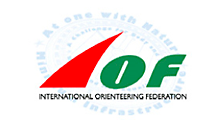 In a common proposal for the IOF General Assembly, the Nordic orienteering federations (NORD) suggest several changes to the international orienteering calendar which is thought to provide higher quality and more attractive events.
In a common proposal for the IOF General Assembly, the Nordic orienteering federations (NORD) suggest several changes to the international orienteering calendar which is thought to provide higher quality and more attractive events.
The proposal consist of the following points (see the full proposal here):
- Splitting of WOC into urban and forest WOC – each organized every second year. terrain WOC would include the Middle, Long and Relay disciplines plus one additional “first-to-finish” discipline. . The urban WOC would include the existing individual start sprint discipline (with qualifications and final), a knock-out sprint discipline based upon the experience of the World Cup (NORT) and a sprint-relay. The split WOC would guarantee for more nations the realistic possibilities to apply and host WOC because of reduced organizing costs. Also the costs of participating at WOC would be decreased.
- Less competitions in MTB-O, Ski-O and Trail-O. In MTB-orienteering, Ski-Orienteering and Trail-O should one major event held annually in all disciplines, World Championships or Regional Championships.
- World cup should consist of 3-4 rounds between April and October. No single events should be organised separately and definitely not in January-March.
- Some points related to financing/marketing (as the sanction fee needs to be reduced).
Discussion: Split WOC model
– There are more arguments for splitting into two WOCs than against it – that is still my opinion
The split WOC model has been discussed here at WorldofO.com in detail before (see e.g. this article) – including a poll among the readers of WorldofO.com where nearly 80% where in favor of a split WOC model (see below). The General Assembly in Lausanne in 2012 decided against the split WOC model after a narrow vote – and now the Nordic federations bring this item up again.
There are more arguments for splitting into two WOCs than against it – that is still my opinion. I will not include the full discussion here again, but as pointed out by NORD the split WOC should ensure that more countries can host a WOC and better quality events.
 World of O News
World of O News
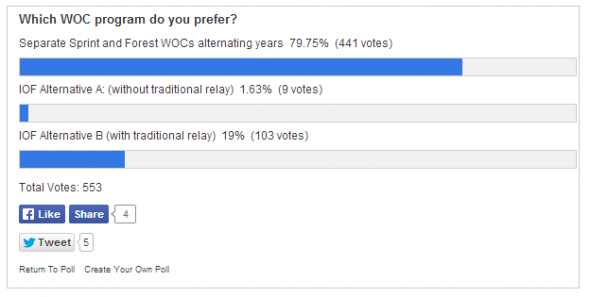
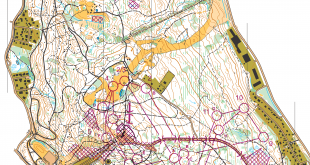
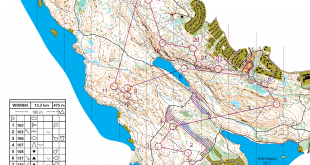

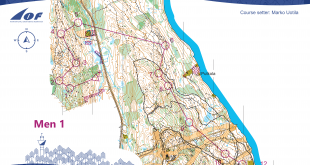
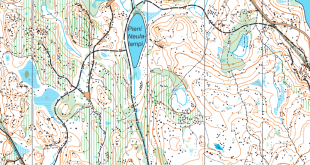
Sometimes I wonder about NORD.
For their terrain-WOC proposal, they want to continue to limit small-nation participation in Middle and Long, the preferred events of small-nation countries.
They complain about cost of WC, but who wanted the right to bring 8 or 10 athletes of each sex to WC races in the first place? (Or was that SUI?) And who instigated NORT?
And the big unknown… will sprint-relay lead to people getting knocked out?
Still, it’s nice to see some reflection. (Sorry for the bitchy post.)
I fully agree with you that there is a need for some kind of qualification. I like Knut’s suggestion ; “Why not start with one middle qualification and later use middle final result (A & B finals) as qualification for long”. Alternatively (and as a minimum) I think there should be a low-key qualification one or two days ahead of the first discipline for “non-qualified” athletes. With a 5 day championship this would be a lot less problematic than today.
I think the new NORD proposal is a big step forward ( a pity that the proposal is about five years late, but still positive). However, I fully agree with Neil that more competitors must be allowed to enter, and this calls for qualification race(s). Why not start with one middle qualification and later use middle final result (A & B finals) as qualification for long. And use both long and middle results as qualification for mass start final race. This limits the overall burden on the top runners to an acceptable level.
“Why not…?”
One good reason: they are different disciplines and may be held in very different terrain.
Another: would you really want to force the likes of Jani Lakanen (from last year) to get a place in the middle and to run just well enough so as he can book himself a place that he cares about in the Long.
The old system wasn’t broken.
And as for mass start races. Currently, world champions are held in awe. It would be good to keep it that way.
As my brother writes, the current overloaded IOF WOC/World Cup schedule is pretty bad.
Re. q races: Yes, please!
You could even have a “red group”, i.e. runners with sufficient ranking points are directly qualified to the final, but any country can send a full complement of runners, and the results of the qualification race determines something like half the final start list.
Using the Middle races as qualifiers for Long is possible, even if these two races are supposed to test different qualities. I.e. just like the current situation forces anyone not from a major O country to specialize in Sprint, this suggestion would strongly emphasize Middle.
OTOH, Middle distance _is_ the most intensive orienteering event, the one where we really separate ourselves from all other athletic pursuits.
I hate the idea of separate sprint and forest WOCs.
How would you explain that to public? “This year we are running only in urban areas and next year our championchips will be held in the middle of forest”.
And “I won long distance last year but I can’t defence it this year because we don’t have long distance in WOC programme this year”.
Same medals should be given out every year.
It would also be so boring as an athlete, because you can’t (or have to) be an all-rounder. Every second year you have to focus on sprint and every second you are training only for forest disciplines.
I’m also afraid that divided WOC would lead to new weird and stupid competition forms like knock-out sprint and mass start long distace…
There are several advantages and disadvantages with a split model, as I discussed in this article previously. But as I state above, I think the advantages are bigger than the disadvantages as a whole. I am not 100% sure about it though, but at least it deserves to get considered in a proper way.
I won’t repeat all arguments here, just briefly comment on a few of your remarks.
> How would you explain that to public? “This year we
> are running only in urban areas and next year our
> championchips will be held in the middle of forest”.
> It would also be so boring as an athlete, because you
> can’t (or have to) be an all-rounder. Every second
> year you have to focus on sprint and every second you
> are training only for forest disciplines.
I agree that in several respects this is not ideal. On the other hand you should have regional championships the alternating years (EOC for Europe), giving a title to fight for every year.
> It would also be so boring as an athlete, because you can’t
>(or have to) be an all-rounder. Every second year you have to focus
> on sprint and every second you are training only for forest disciplines.
Just as boring as in the old days with World Champs every second year? You’d still have a lot to focus on – and also the possibility to get all the best on both sprint and terrain WOC (which you don’t have today).
Who cares about urban orienteering anyway? Okay, sprint is a tolerable addition to some multi-day events, but, seriously, nature is the essence of this sport. Look at all multi-day orienteering events out there – people (participants) want interesting natural terrains. Take Swiss-O-Week for example. Would people go if it was held in Zurich? Maybe, I don’t know, but then those would be clearly different people and it would be a different sport, in my opinion.
Why would elite do something else? Anyway, elite can do whatever they like, I believe most people will appreciate the essence of our sport and that is going out to the nature.
By the way – why this obsession with Olympics? Why TV? Forget about money, go out to nature and enjoy!
@Nature Boy: I am also most fond of orienteering in the forest, but urban orienteering is a part of the sport – and there are several good reasons for it being a part of the sport also in the future.
With regards to your other comment: Sprint-orienteering is more interesting for elite (with high speed, i.e. challenging orienteering) and young people/beginners (due to simple orienteering, easy access) than for e.g. veterans who have been running orienteering for many years and don’t have the speed to get the technical challenge in this discipline. Sprint orienteering in technical areas is popular by most orienteers – sprint orienteering in easy areas is not popular.
Olympics is a different question, that is not part of this discussion in my opinion. And sprint is also not for TV – rather for the arena spectators.
Why would a country apply for forest WOC if their runners have no chance (no q race) to qualify for Long?
If I understand the NORD proposal they want to have some kind of closed list of runners based on WC or WR points.
One reason to split WOC is to allow all the best runners to run all disciplines. If this is the goal I would rather see the Long as the last discipline of the WOC and qualification for Long could include all disciplines (Sprint,MiddleQ and First-to-finish). 40 best runners with 3 valid results + 5 best runners with 2 valid results.
What hits me most, is that the NORD seriously proposes to introduce “knock-out sprint discipline based upon the experience of the World Cup (NORT)”. What exactly was the experience back then? :-P
I’m glad that the alternating urban-forest WOC might be back on the table. Each of the WOCs could/should have five races. A short race (15 min urban, 30 min forest), a long race (45 min urban, 90 min forest), separate mens and womens relays (3×15 urban, 3×45 forest) and quali races for each of the individual short and long races (but perhaps some athletes get direct qualification based on previous performance or using the existing qual rules for WOC). The growth of urban racing in the UK with longer city races demonstrates that a ‘longer’ urban race is likely better than knock-out. Also, having the same format in each of urban and forest (just with different winning times) would be easier to explain to the public. What are the chances that IOF will ‘listen’ to NORD?
Good idea to alternate Forest and Urban WOC. Two points re Urban WOC – there should be a longer distance race; there is absolutely no reason to have all the races sprint distance.
Secondly: the Sprint itself should be a stand alone sprint; there is no need for a qualification race. Given the short start intervals all countries could have 3 (or more) competitors.